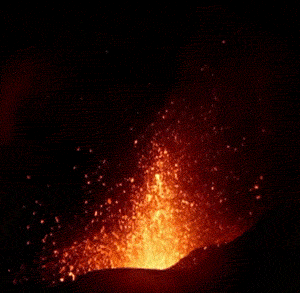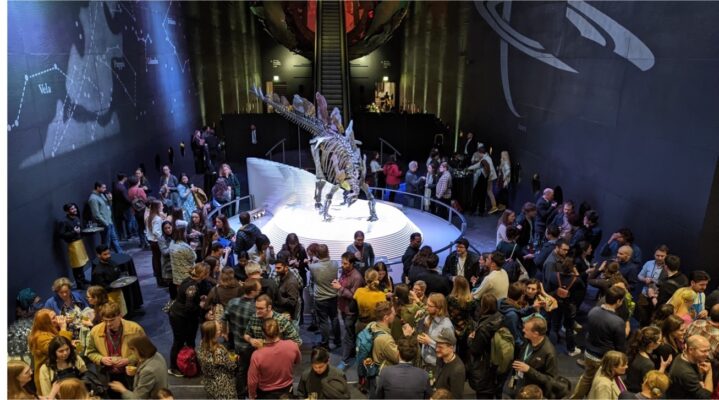

Dear volcanic and magmatic colleagues, welcome to the VMSG Newsletter, February 2023. The shortest month of the year is the cigarette butt of winter, but it’s also the month of Imbolc and St. Valentine’s, of lengthening days, of turning towards the light. We bring to you this February a set of exciting news and views to remind you there is light at the end of the tunnel vision. As ever, happy reading! – Ailsa Naismith
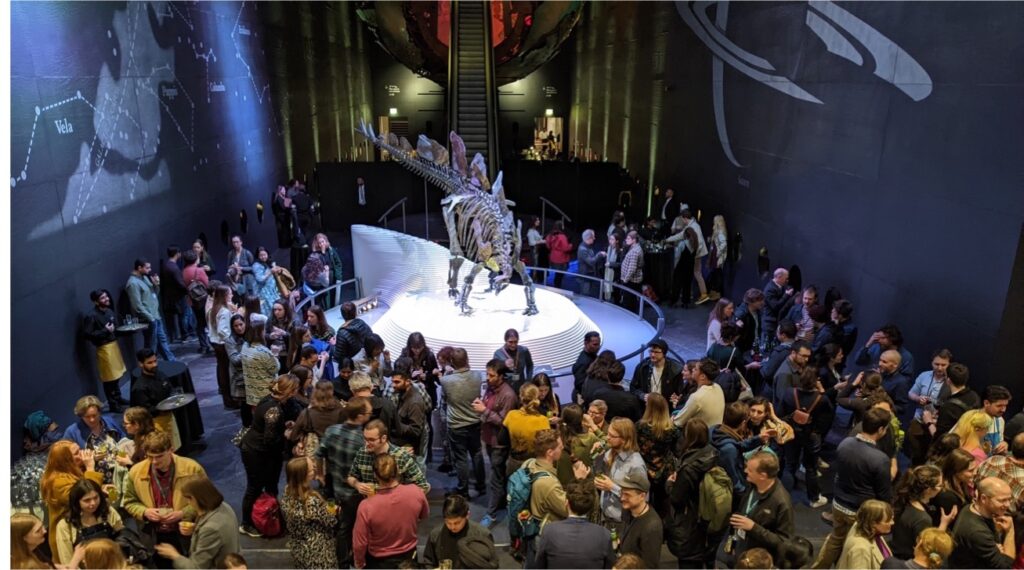
The VMSG2023 Dinner in the NHM Great Hall
We share below a few words from the Local Organizing Committee, the Volcanologists of London (VoL) group. People agreed that the VoL organized a splendid conference, full of variety and flourish. This reflection shows that VMSG2023 did not come without challenge and enormous effort, but its success was well worth it:
“After 20 years, VMSG returned to London, organised by the Volcanologists of London (VoL) group. The congress was hosted by Birkbeck College and UCL in Bloomsbury from the 4th to the 6th of January 2023, with the conference dinner on the 5th in the iconic Earth Hall of the Natural History Museum (NHM) in South Kensington and an entire day of volcano outreach and activities hosted by NHM on Saturday the 7th.
It was the first in-person VMSG after the pandemic and the expectations were very high. Over 200 colleagues braved the 4 days long train strikes and made their journey to London to attend the conference, saving the VoL organising committee from bitter disappointment. Immediately following the conference, the Volcano Day at the NHM was an incredible success and the largest outreach event for the VMSG community. Over 90 volcanologists from across the UK and Europe joined the VoL on the Museum gallery floor with an incredible variety of hand-on activities over 11 stations. The NHM Learning team ran twice their ‘Emergency! Earthquakes and Volcanoes Show’. Chiara Maria Petrone and Nicolo Nardini entertained the public in the Attenborough Studio talking about volcanoes and how we study them. We had over 20,000 visitors to the Museum that day and almost certainly helped inspire a few future volcanologists!
Organising the conference and the outreach activity was challenging but very rewarding. We had to overcome several problems related to the logistics of moving between two sites, Birkbeck for the talk and the nearby UCL for posters. Organising the dinner at NHM proved expensive but very rewarding, and managing the health and safety for the outreach event was a challenging task that Mihaela Swift navigated brilliantly (thank you!). The final headache was caused by the announcement of 4 days of rail industrial action exactly during our conference week! It was too late to come up with a different plan, so we embraced it and hoped for the best. We can now happily say that everything ran smoothly, and we thank Kevin and Russell at the MinSoc and all the VMSG community that helped us to make it happen.” – Chiara, Chris, Eleanor, Hilary, James, Lauren, Michele, Mihai (Volcanologists of London)
VMSG2023 was a wonderful opportunity to award prizes to esteemed members of our community. Professor Eliza Calder (University of Edinburgh) received her Thermo-Fisher Scientific award after a rousing citation by Dr. Eric Breard highlighting her many and diverse accomplishments, and Dr. Nick Barber (McGill University) received the Zeiss Postdoctoral Keynote Award for his outstanding academic achievements and wholehearted support of budding geologists in his community. Both awards were presented at the NHM’s dinner. Eliza’s and Nick’s keynote speeches at VMSG2023, respectively on science communication in Guatemala and on magmatic processes driving metal systematics, were fascinating and thought-provoking. Congratulations to both!
VMSG2023 gave us the opportunity to hear about new and exciting science across the board. We were so impressed by the outstanding quality of student presentations this year. The 2023 winner of the Bob Hunter prize for best student oral presentation was Emma Watts (University of Southampton), and the runner-up was May Chim (University of Cambridge). The winner of the Geoff Brown prize for best student poster presentation was Kerys Meredew (University of Birmingham), and the runner-up prize was awarded to Kyra Cutler (University of Oxford). Many congratulations to all for your well-deserved awards!
214 people registered for VMSG2023, of which 108 (50.5%) were students. We had representation across all career stages: 2.3% of attendees were undergraduates, 46.7% were postgraduates (including final year), 21.0% were on fixed-term academic contracts, 2.8% were between contracts, 19.2% were permanent academic staff, and 3.7% were from industry and/or government. Of our student attendees, 25 (23.8%) gave an oral presentation, 65 (61.9%) gave a poster presentation, and 3 (2.86%) attended remotely.
Videos from the VMSG2023 conference will shortly be up on the VMSG’s YouTube channel, thanks to the hard work of Elliot Carter. Subscribe to the YouTube channel here and follow along for updates on the VMSG’s official Twitter here.
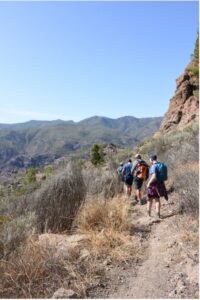
Fieldwork in Gran Canaria (Credit: A. Foster)
During the course of my PhD, I have spent hours upon hours delving into the intricate textures found within silicic lavas that clog conduits. My work to date has been grounded in a new model, the ‘cryptic fragmentation model’, a process in which hot ash and pyroclasts are captured on conduit walls and sinter to form silicic lava (e.g., obsidian). This process is described as ‘cryptic’ and well, very much is, as sintering often eradicates any trace of a material once being a particulate state. The challenge is then to unravel the eruptive history of the lava. Fortunately, ignimbrites can also be welded, and at a much colder temperature compared to volcanic conduits as they deposit subaerially. Ignimbrites can even be welded to a point that glassy layers form, so in the past have been misidentified as lavas. The crossover was perfect, I could go look at welded ignimbrites with conduits in mind.
And thanks to the VMSG student travel bursary I was able to visit Gran Canaria (GC) to do this with Fabian Wadsworth, Rich Brown, Hugh Tuffen and Owain Smith. We were thrilled to see that most of the ignimbrites on GC have been dissected by roadcuts, although this did mean driving was a hard job when you’re trying to keep your eyes on the road (the photo is one of the rare cases we strayed more than 100 m from the car)! Throughout the fieldwork, there was lots of excited discussion about how the textural features we were looking at in the ignimbrites were like replicas of silicic conduits and/or lava domes we’ve seen on previous field excursions. This fieldtrip has given me so many ideas on how to combine these two worlds of volcanology, so watch this space (or for updates on my Twitter page, @volcannabelle) to see the outcome of this opportunity!
Once again, I would like to say a huge thank you to the VMSG committee for awarding me with this bursary, it has greatly enriched my PhD. If you are interested in this work, please do get in contact with me at annabelle.foster@durham.ac.uk – Annabelle Foster
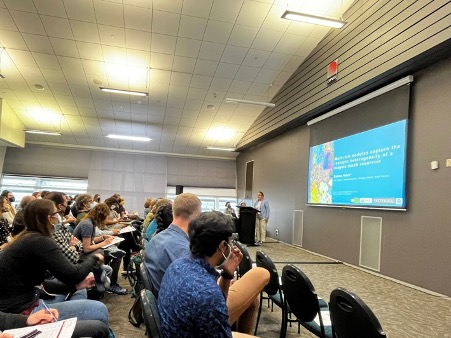
A glimpse of the mush presentation session displaying the title slide (Credit: E. Horn)
I was very fortunate to be able to present my PhD work, in person, at the January 2023 IAVCEI conference held in Rotorua, New Zealand. It was the first time I’ve been able to travel to and attend an international conference due to the pandemic. It was made even better having submitted my PhD thesis just before the Christmas holidays and a great opportunity to be able to discuss my work with the international community, without worrying about thesis writing! The theme of the session I presented in encompassed research looking into integrated approaches to track the lead-up to volcanism: “Unlocking the mush”. This was one of nine parallel symposia running as part of the busy IAVCEI schedule. My presentation was entitled ‘Melt-rich nodules capture the isotopic heterogeneity of a magma mush reservoir’. The presentation slot was only 12 minutes so I provided a quick overview of the chemistry and characteristic of interstitial melts found within cumulate nodules from Tenerife. Most of the details are given in my recent Journal of Petrology paper (Horn et al., 2022) but it was the first time I presented my lead isotope results from the second data chapter of my thesis. The talk is all a blur now but I got very good feedback from the audience and I met many new people because of interest in my research post-talk. A very different environment compared to giving an online presentation. It was a relief to be able to present so early in the conference as it was an extremely nerve-racking experience. Everyone was very kind and I was asked a number of thoughtful questions. This made it a really nice environment to present in as an early career researcher. The IAVCEI conference provided invaluable presenting practice and the opportunity to network with other researchers again. Rotorua was very rainy but in the few days of sunshine we had, it was a very beautiful place to host such an event. – Emma Horn
The VMSG Henry Emeleus Fieldwork Grant is open and accepting applications until Tuesday, 28th February 2023. This grant is intended to support researchers to carry out fieldwork for their studies, and honours the pioneering work that Henry Emeleus undertook in the Paleogene North Atlantic Igneous Province. Funding can be requested up to a maximum of £1000 to support fieldwork (e.g., transport, accommodation and field logistical support).
Full details and the application form are available on the VMSG website (here). Please send your completed application forms to emma.liu@ucl.ac.uk
The Thermo Fisher Scientific and Zeiss Postdoctoral awards are open and accepting applications until Tuesday, 6th June 2023. The Thermo Fisher Scientific Award is bestowed annually on an individual who is deemed to have made a significant contribution to our current understanding of volcanic and magmatic processes. The Zeiss Postdoctoral Award is bestowed annually to the lead author of an outstanding paper within the VMSG remit, who has also made significant contributions to supporting others in their community. More information on the Thermo Fisher Award can be found here and on the Zeiss Postdoctoral Award here.
PLEASE NOTE – Three important details of submissions to the Zeiss Postdoctoral Award:
The winners of each award will be invited to deliver a keynote at the annual VMSG conference (VMSG2024 will be held in Bristol). Expenses will be provided to support the awardees’ attendance of VMSG2024.
Full details and application forms are available on the website (Thermo Fisher Scientific Award and Zeiss Postdoctoral Award). Please send your completed application forms to emma.liu@ucl.ac.uk
Applications are invited for a 30 month (2.5 year) postdoctoral fellow with experience in volcanology and geophysics. The search is for a Senior Research Associate to work as part of a new NERC-funded research project “Forecasting Eruptions at Volcanoes after Extended Repose” (FEVER). Full details will be announced shortly. For informal enquiries please email Phil Benson at the Portsmouth RML.
More details on the post are available on the pre-announcement page here.
An exciting new opportunity has just been announced by the University of Leeds for an experienced and ambitious leader of the new Geosolutions Research Centre, part of the university’s investment in climate change mitigation. The post-holder will be involved in placing subsurface research at the forefront of addressing the climate crisis and will oversee development and delivery of innovative interdisciplinary subsurface research focussed on the energy transition.
The closing date for applications is Sunday, 26th March 2023. More details are available here.
The Faculty of Science and Engineering is looking for a technician to support the School of Geography, Earth and Environmental Sciences (SoGEES). The post-holder will work under the direction of the School Technical Manager and deliver support to teaching and research activities predominantly in Chemistry but also Geography, Earth and Environmental Sciences. Candidates must have previous experience of working in a laboratory environment.
The closing date for applications is Monday, 13th March 2023. Full details on the post are available here.
Do you have any job opportunities, PhD Viva voce celebrations, or funding opportunities that you would like to advertise in this area? If so, please get in touch with ailsa.naismith@bristol.ac.uk .
Don’t forget to keep in touch with us and other volcanologists around the world. There are several ways you can do this: through the VMSG PhD and ECR directory (here), the Arizona State University mailing list (here), and the VMSG mailing list (here).
